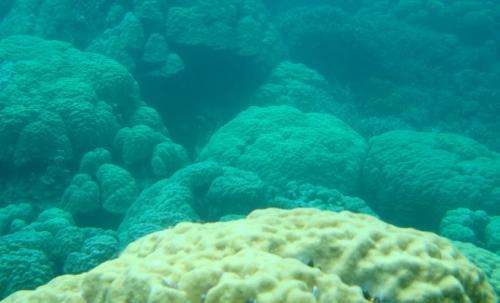Study finds climate refuges where corals survive, grow

Reef-building corals, already thought to be living near their upper thermal limits, are experiencing unprecedented declines as the world's oceans continue to warm. New evidence from scientists at Florida Institute of Technology shows there may be some climate refuges where corals will survive in the future.
The study appears in the March issue of Global Change Biology.
Ph.D. student Chris Cacciapaglia and his advisor, Robert van Woesik, hypothesized that not all regions of the oceans are warming at the same rate.
"The idea was to identify regions that will experience little temperature change by the year 2100 —refuges where coral survival is most likely," Cacciapaglia said.
Although their models show significant loss of corals as the oceans warm, they also highlight 12 areas - five in the Indian Ocean and seven in the Pacific - where corals are likely to survive at least until 2100.
"These refuges should be essential for coral survival into the future, and these locations deserve protection," said van Woesik.
Van Woesik emphasized that local marine protected areas are not the only viable management option. The new study points to global sanctuaries as a more comprehensive management strategy.
More information: Learn more about the study at onlinelibrary.wiley.com/doi/10 … 1/gcb.12851/abstract
Journal information: Global Change Biology
Provided by Florida Institute of Technology

















